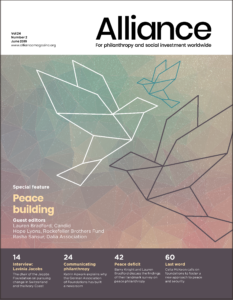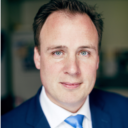Peace is never a quick fix. Everyone knows that. The field of peace and reconciliation needs patient and committed funders, not fickle and easily distracted ones. Whether a philanthropist fancies working on international or local levels, this adage always applies. It is steadfast and long term commitment that this line of work needs.
On a separate but very closely linked note, the numbers remain low as the latest Peace & Security Funding Index of the Peace and Security Funders group sadly shows. Not even one per cent of global philanthropic giving goes into peace and security funding! A fact that is fascinatingly appalling in and of itself, and probably makes philanthropic institutions shy away from funding this field. People want to associate themselves with success and things palpable. Not with this kind of arduous, risky, and politically sensitive work. That is a pity, because there is so much to do, and there are so many opportunities to be really meaningful for human beings suffering the brunt of violence and conflict.
It seems, partly for the reasons mentioned above, that peace building is not a very sexy area to invest in for many philanthropic institutions. That needs to change. A first and vital step for philanthropists and their foundations would be to take up a more inclusive and integral approach in their funding. For peace funding to work and be impactful, a funder needs to look beyond his role as a funder. A funder is essentially more than just a funder. He or she is not only representing a budget, but is networked, knowledgeable, and many times politically engaged at the same time.
Two years ago we decided to phase out as a funder in some of our peace and reconciliation programmes in Mexico and Colombia. We had been with our partners for a long time and analyzed the situation as ready for gradually phasing out budget-wise. A hard choice that we felt we had to make for reasons of having adopted a new strategy. A few weeks after our decision had been communicated, we got a politely-resolute and rather surprising answer along the following lines: We understand that you want to go, but we are not done with you yet. In the past few decades of working together we have come to know you as friends. Friends do not leave each other. Trust is a two-way thing. We need to talk.
And talk we did. Frank but respectful conversations followed. These talks eventually lead to the conclusion that as time passed our funder-grantee relationship had evolved. It had grown into a partnership that also encompassed joint advocacy efforts on local governmental levels, as well as moral support, joint analysis and action on human rights atrocities committed against women and indigenous peoples.
This particular example made me realize again that we are – at the core – human beings. Not just funders. And that this having more roles than just the classic funding role actually makes us more effective in peace and reconciliation efforts in both countries. So we remain. Small-scale and without significant amounts funding. But with a readiness and energy to take up other roles. Continuing and trying to be more than just a funder.
A funder who only demands matrices to be filled out on time by his grantees is simply not understanding the potential for great peace building he has at his fingertips. If funders were able to look beyond the administrative requirements their grantmaking imposes on grantees, they would come to realize that they should take up other roles as well, parallel to the grantmaking. Roles like educating policy makers, or being the linking pin in specific networks, or brokering knowledge. This is hard to acknowledge. And maybe even harder to do. But, to end on a positive note, only dead fish follow the stream.
Rick van der Woud is director at Mensen met een Missie
 Peace-related philanthropy, at less than 1 per cent of all grantmaking, seems irresponsibly small given that armed conflict spoils lives, divides societies and ruins economies.
Peace-related philanthropy, at less than 1 per cent of all grantmaking, seems irresponsibly small given that armed conflict spoils lives, divides societies and ruins economies.
Our new issue goes in search of philanthropy’s role in peaceful development.






Comments (1)
Rick, this is a timely reminder that if foundations want real transformative peace they must think in decades, not just dollars. It was wonderful to meet you at the Rotary international convention in Hamburg. Let’s find ways to build peace together.